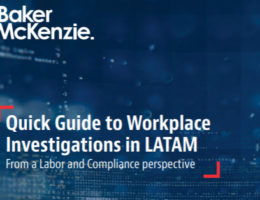Since the inception of the European Union’s Whistleblowing Directive in 2019, we have seen greater scrutiny of whistleblowing practices and a number of key jurisdictions beyond Europe upgrading their whistleblowing laws. Read on for a summary of the latest developments in whistleblowing laws across the globe.
While the pandemic has disrupted business operations across the globe, Latin America is emerging as a promising destination and many companies are setting their sights on the region. More and more, companies are keen to understand what they need to know when expanding in Latin America from an employment perspective and how obligations and risk vary from jurisdiction to jurisdiction.
Mainly during the pandemic, the use of technological resources for performing a job has significantly grown. As a result, the access to such resources in the context of internal investigations has become almost a must. This triggers relevant concerns from a data privacy and a labor perspective.
The Ministry of Health and Social Protection issued Resolution 392 of 2021, by which it modified Article 2 and sections 4.1 and 5 of the technical annex of Resolution 666 of 2020, recently modified by Resolution 223 of 2021 regarding biosafety protocols.
On 6 January 2022, the Congress of the Republic enacted Law 2191, which aims to create, regulate and promote the labor disconnection of workers in order to guarantee the effective enjoyment of free time and rest times, licenses, leaves and/or vacations to reconcile personal, family and work life.
With major vaccine developments in Latin America, including kick-offs for vaccine campaigns, employers should consider whether a vaccination policy is right for their workplace, keeping in mind that such policies implicate a broad range of employment laws and regulations, and that many of these vary from country to country.
An Employment & Compensation Practice and Healthcare & Life Sciences Industry Initiative
With major vaccine developments in Latin America, including kick-offs for vaccine campaigns, employers should consider whether a vaccination policy is right for their workplace, keeping in mind that such policies implicate a broad range of employment laws and regulations, and that many of these vary from country to country.
This newsletter features updates such as the following:
• Colombian Congress enacts the Remote Work Law
• Colombian Congress enacts Law 2114 of 2021 on paternity leave, shared leave, flexible part-time leave and anti-discriminatory measures
• Colombian Congress enacts Law 2141 of 2021 on paternity protection and other provisions
The Government recently enacted Law 2101 of 2021 (“Law”) which came into force on 15 July 2021 and aims to reduce the working week from 48 to 42 hours in a gradual manner (from 2023 to 2026).
With COVID-19 vaccinations finally here, organizations looking to protect their workforces and promote business continuity must navigate a fast-evolving framework of national protocols and regulatory regimes. An increasing number of jurisdictions across the globe are publishing guidelines and legislation governing the legal and practical aspects of workplace vaccination programs.







